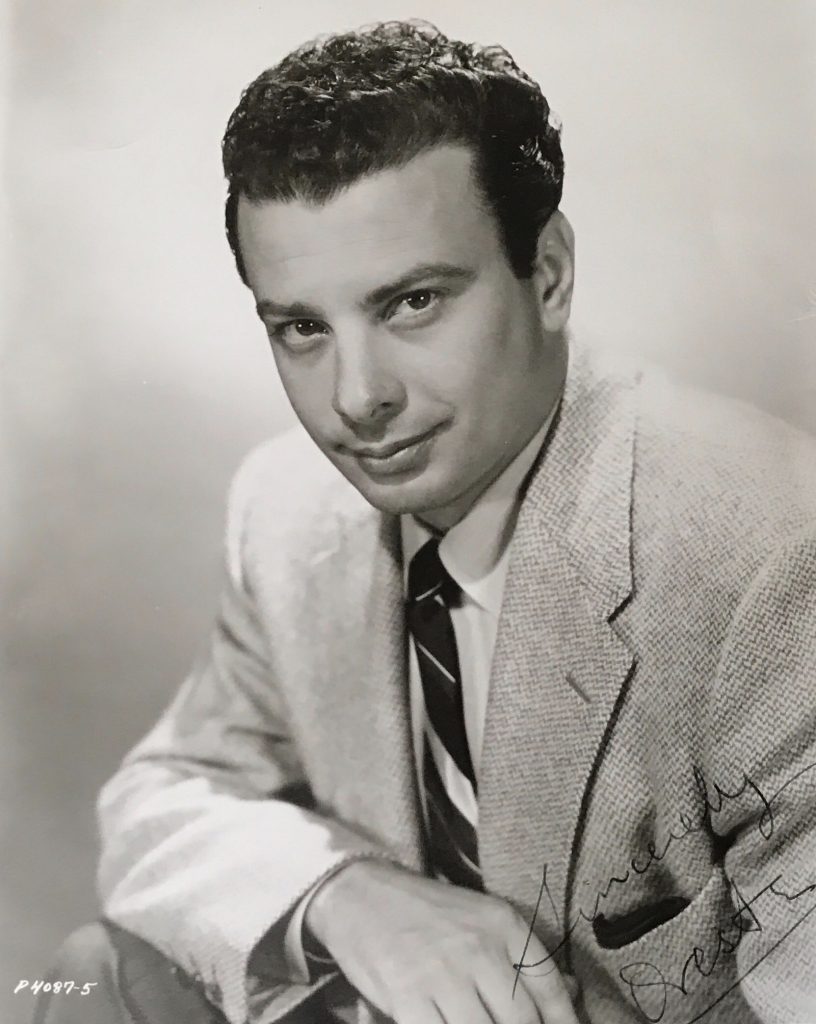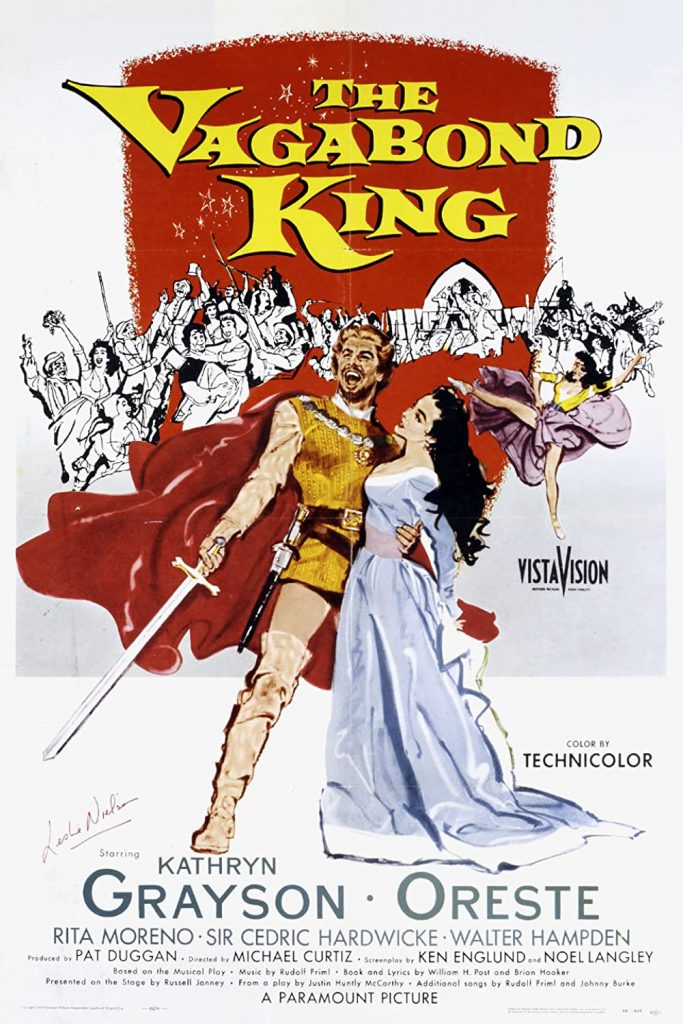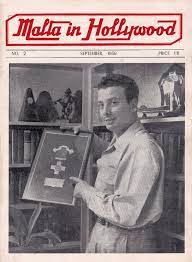
Oreste Kirkop biography from “Opera Vivra”.
Oreste Kirkop (Chircop), Malta’s singing ambassador of the Fifties who achieved international fame was born at Hamrun on July 26, 1923, the sixth child among the ten siblings of Jean Chircop and Fortunata Panzavecchia. Discovered and trained first by the Maltese tenor Nicolo’ Baldacchino, and later by Giuseppina Ravaglia, the voice of Oreste Kirkop emerged during the immediate post war period. He made his debut as Turiddu in Cavalleria Rusticana on the 24 February 1945. Following his successful debut he continued to sing other leading tenor roles in Madama Butterfly, Rigoletto, Bohème, Traviata, Lucia di Lammermoor, Faust, Tosca and the Maltese opera Figlio del Sole.
The 23rd December 1948 remains an important date in the career of Oreste Kirkop when as a member of the audience sitting in the auditorium of the Manoel Theatre during a performance of Rigoletto, he was asked there and then to substitute for the indisposed Italian tenor who had to abandon the production after the second act. Oreste’s presence on stage brought great excitement among the audience. By the beginning of the last act he had gained confidence and was in such fine fettle that he completely stole the show by his rendering of La donna è mobile, ending on a beautifully sustained ringing top note that brought the house down with shouts of ‘bis’ – as the audience stamped their feet, bringing the performance to a temporary halt. Verdi’s Rigoletto was brought to an exciting conclusion and the crowd left the Manoel Theatre elated at the evening’s unexpected performance.


Between November 1949 and May 1950 Oreste had the opportunity to appear in concert with two famous La Scala singers, the celebrated baritone Tito Gobbi and the equally famous soprano Maria Caniglia.
Meanwhile Maltese baritone Joseph Satariano, who have achieved great success singing abroad in the company of great stars including Schipa, Melba and Chaliapin, visited Malta during the summer of 1950. On hearing the young tenor, he invited Oreste Kirkop to join him in London for an audition with the Carl Rosa opera company. By this time Oreste had already given some 150 performances in Malta, appearing in 10 different operas.
After a successful audition, Oreste made his debut with the Carl Rosa on 19th September 1950 as the Duke in Rigoletto at the Grand Theatre in Leeds. The Yorkshire
Evening Post reported in bold headlines “He is an echo of Caruso : Oreste Kirkop, a young Maltese tenor scored a great triumph in his debut” adding “Kirkop for whom a great future is predicted is a young tenor of distinguished appearance and fine physique”. Throughout his three seasons with the Carl Rosa opera company, Oreste continued to forge a sound operatic repertoire and a commanding stage presence. These were the formative years in which he acquired more experience in the company of established singers and great conductors like John Pritchard, Edward Downes, Charles Mackerras.
1953 proved to be a very important year — a year of achievement. He left the Carl Rosa company to become the leading tenor of the Sadlers Wells scoring an overwhelming success in Cavalleria Rusticana, Bohème and Tosca. The Daily Express critic wrote: “The Maltese tenor Oreste Kirkop faced his first London audience. He quickly proved himself to be a singer of real merit. Good tenors are scarce everywhere and worth their weight in gold in Britain. Mr Kirkop’s tone is solid and full. It has meat on its bones”.
The Opera Magazine of May 1953 in its review written by Harold Rosenthal said: “He is one of the best Cavaradossi’s heard since before the war and I can honestly say
that not since Gigli‘s appearance in this part in 1938-39 have I heard the last act music so beautifully sung”.
Oreste hit the headlines once again when he inaugurated the Sadlers Wells Autumn Season with a revival of Luisa Miller, an opera by Giuseppe Verdi, which had not been staged for 75 years. “Kirkop’s tone is rich and golden, but he has not rested content merely with nature’s gift. He has cultivated a style which now makes him the finest Verdi tenor in this country”.
In between these roles Oreste became a frequent guest of various radio and television stations including a BBC production of I Pagliacci in which he sang the role of Canio. It was also at this time that British film companies including London Films, Associated British Pictures Corporation, as well as Hollywood’s Paramount Pictures, cast their eyes on the Maltese tenor, but Oreste’s choice was for Paramount Pictures.
The August 1953 edition of Opera Magazine singled out the leading singers for that year’s outstanding oval achievements: Norma — Maria Callas, Orpheus — Kathleen Ferrier, Amneris — Giulietta Simionata, Adalgisa Ebe Stignani, Boris Godunov — Nicola Rossi Lemeni, Cavaradossi — Oreste Kirkop.
It was therefore no surprise that Covent Garden management began to show keen interest in engaging Oreste Kirkop which finally led to an invitation for a number of guest appearances. Oreste Kirkop’s debut at Covent Garden in the leading tenor role in Rigoletto took place on the 18th January 1954. With this performance Oreste became the first Maltese tenor ever to sing a major role at the Royal Opera House Covent Garden. The following day The London press acclaimed Oreste and gave prominence to his vocal and histrionic talents: The Star reported in big headlines: “Kirkop, superb at the opera had to halt which each aria was applauded, something that does not often happen at Covent Garden”. The Daily Express — “Oreste Kirkop, 28 year old Maltese tenor was one of the four stars who shone at Covent Garden last night in Rigoletto. The Daily Mail — “Oreste Kirkop, a young Maltese tenor accorded a hearty share in the plaudits at the end of Rigoletto last night has the aura of success about him. He acts with confidence and has physical as well as vocal grace. He sang the famous part of the Duke of Mantua with superb technique”.
The Financial Times covering a London Production of Tosca after Oreste had left for America reminded its readers that “with Oreste Kirkop’s departure for Hollywood, we have lost a splendid Cavaradossi.”
Hollywood eagerly awaited its new star and spared no effort to launch its new discovery. The name of Oreste Kirkop, the singing star form the Island of Malta appeared on every newspaper, while top notch personalities including Bob Hope and Bing Crosby introduced the new singer to millions of viewers on American T.V. For Paramount Pictures, Oreste undertook the title-role in The Vagabond King with music by Rudolph Friml playing opposite a star-studied cast — Kathryn Grayson, Sir Cedric Hardwick and Rita Moreno. Much admired in its time, the film was shown wildly in America and throughout Europe. It was also featuredby the BBC in 1968 among the great musical milestones of the silver screen.

Among the first to sing straight opera in Las Vegas between 1956-58, Oreste found new audiences and adulation through an exclusive contract with the NBC Opera Company with whom he visited 57 American cities, always appearing in leading tenor roles. His engagements included the first ever TV production of Rigoletto, which was beamed live from New York. He was also in great demand to appear on all American’s principal television personality shows including ‘Shower of Stars’. After 3 years in Hollywood, Oreste, at his own request, left Paramount Pictures. Recognizing Oreste as a performer of significant box-office impact, Covent Garden, The Daily Mail of the 9th April 1958 wrote “One could have imagined at Covent Garden last night that Puccini wrote the part of Rodolfo in La bohème for Oreste Kirkop”.
One critic summed up the reasons for Oreste Kirkop’s meteoric rise to fame. “With a voice whose opulence sweeps up in splendid climaxes, in turn exultant, compassionate, tender, now ringing like a trumpet call, now with high notes opening like a flower on a stem, Oreste Kirkop, the Hollywood singing star enchains his audience. His repertoire ranges from entreating Neapolitan songs to operatic arias and with each melodic cameo is a little story — Bravissimo!”
Malta is proud of Oreste Kirkop. His art reigned supreme — and wherever he went the name of Malta went with him; proving himself not only a great artist but also Malta’s singing ambassador. To* of Malta’s Prime Ministers in office at the time of Oreste’s career sent their personal messages of appreciation for the good name and publicity he gave to Malta in the foreign press. His successful career always in leading tenor roles enabled Oreste to make his wish come through, to retire in Malta, which he did in 1960.
Good tenors like Oreste Kirkop are a rare breed. The voice was of a remarkable quality used with intelligence and great artistry. Even when singing at extreme dynamics, under pressure, Oreste’s voice retained its characteristic glowing beauty. Apart from his singing, he was also a great personality on stage. Personality is almost as important as the voice. One could easily pick him out of a crowd, because his private personality was an extension of his great personality on stage. And this combination is a rare quality indeed.


